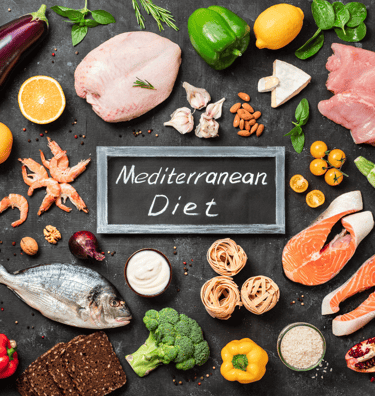Five Most Beneficial Food Diets: Mediterranean
In the ever-evolving landscape of dietary choices, five standout diets have gained recognition for their health benefits and positive impact on overall well-being. Let's delve into the essence of these diets and understand why they are deemed among the best.
Mediterranean Diet: The Heart's Delight
The Mediterranean Diet has proven its mettle in promoting heart health and longevity. Rich in fruits, vegetables, whole grains, and healthy fats like olive oil, it reduces the risk of chronic diseases, emphasising the importance of a balanced and flavorful approach to nutrition.
Pros:
Rich in heart-healthy fats from olive oil.
Abundance of fruits, vegetables, and whole grains.
Emphasis on lean proteins like fish and poultry.
Why:
The Mediterranean Diet, consistently at the forefront, is celebrated for its ability to promote cardiovascular health, lower the risk of chronic diseases, and deliver a delicious culinary experience.
The Mediterranean Diet is a nutritional approach inspired by the traditional eating patterns of countries bordering the Mediterranean Sea. It emphasises a balanced and heart-healthy lifestyle by promoting the consumption of fruits, vegetables, whole grains, legumes, nuts, and seeds. One of its defining features is the abundant use of olive oil as the primary source of healthy fats. This diet also includes moderate portions of fish and poultry, while red meat is consumed sparingly.
Scientific research consistently supports the health benefits of the Mediterranean Diet. Studies have shown its effectiveness in reducing the risk of cardiovascular diseases, including heart attacks and strokes, and overall mortality rates. The diet's rich array of nutrient-dense foods contributes to improved heart health, lowered cholesterol levels, and better blood pressure control.
Beyond cardiovascular benefits, the Mediterranean Diet has been associated with a lower risk of various chronic conditions, including certain cancers, dementia, and diabetes. Its emphasis on whole, unprocessed foods and the inclusion of antioxidants from fruits and vegetables contribute to its overall health-promoting effects. Additionally, the diet encourages an active lifestyle, reinforcing the importance of regular physical activity in conjunction with mindful eating.
In summary, the Mediterranean Diet offers a holistic and scientifically supported approach to promoting health and well-being. Its emphasis on a variety of nutrient-rich foods, coupled with lifestyle factors such as physical activity, makes it a sustainable and enjoyable choice for those seeking a balanced and heart-healthy dietary pattern.
The Mediterranean Diet, renowned for its focus on fresh and wholesome foods inspired by the traditional dietary patterns of countries bordering the Mediterranean Sea, comes with a range of advantages and a few considerations.
Advantages:
Heart Health: The diet is rich in heart-healthy fats, particularly from olive oil and fatty fish, contributing to a lower risk of cardiovascular diseases.
Diverse Nutrients: It includes a variety of fruits, vegetables, whole grains, and lean proteins, ensuring a diverse range of essential nutrients.
Mental Health Benefits: Some studies suggest a link between the Mediterranean Diet and improved mental health, potentially reducing the risk of depression and cognitive decline.
Balanced Lifestyle: With an emphasis on moderation and enjoyment of meals, the diet promotes a balanced and sustainable approach to eating.
Disadvantages:
Cost: The Mediterranean Diet, with its emphasis on high-quality olive oil, fresh produce, and fatty fish, can be more expensive compared to other dietary patterns.
Potential Overconsumption: While the diet encourages healthy fats, individuals might unknowingly consume excess calories, leading to weight gain if portion control is not practised.
Cultural Adaptation: Some may find it challenging to adapt to the cultural and culinary aspects of the diet, especially if it diverges significantly from their usual eating habits.
It's essential to approach the Mediterranean Diet with a focus on overall lifestyle rather than strict rules. Consulting with a healthcare professional or a registered dietitian can provide personalised guidance based on individual health needs and goals.


